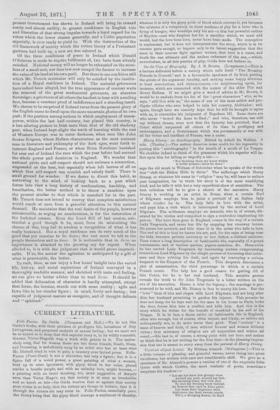CURRENT LITERATURE.
Folk Farina. By Ouida. (Chapman and Hall.)—We do not like Guide's books, with their pictures of profligate life, imitations of Guy Livingstone, and perpetual analysis of sexual feeling; but we must not be so unjust as to deny that this especial story is, in its wildly romantic, dreamy, Victor-Hugoish way, a work with genius in it. The melan- choly song, that for• woman there are but three friends, Death, Sleep, and Dreaming, is melodiously sung by an artist who has at least what Mr. Disraeli tried in vain to gain, a mastery over lyrical prose, Voile- Farina (Flour-Dust) is not a character, but only a figure ; but it is a figure full of a weird power, a great painting of what a woman, bred up in utter ignorance, with gipsy blood in her veins, placed amidst a hostile people, and with an unlucky love, might become,— a painting with an inner• meaning, too, more suggestive of despair even than Victor Hugo's cry that society is at once as irresistible and as harsh as fate—for Ouida teaches that as against that society even virtue is no help, that the virtues are thane to torture, that it is through the virtues sin may enter in, Folle-Furies, essentially pure, the theory being that the gipsy blood conveys a sentiment of chastity, whereas it is only the gipsy pride of blood which conveys it, yet becomes the mistress of a voluptuary, in sheer madness of pity for a lover who is dying of hunger, who worships only his art—a dim but powerful outline of Ilaydon—and who despises her for a sacrifice which, we must add would, had the love been love, never have been made. The conception is unpleasant, but it does not interpenetrate the story, which is in its essence pure enough, or impure only in its latent suggestion that the atara in their courses fight against woman, that love is a curse, and death the one ultimate and the napless redeemer of the sex,—which, nevertheless, in all this passion of pity, Oaida does not believe in.






























 Previous page
Previous page